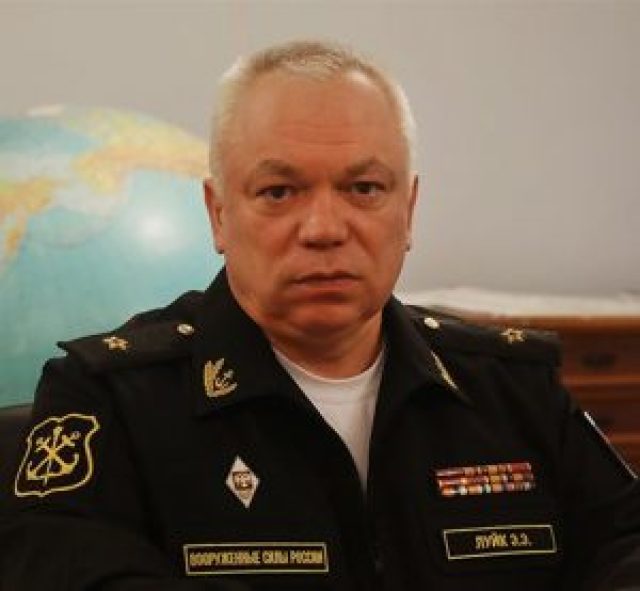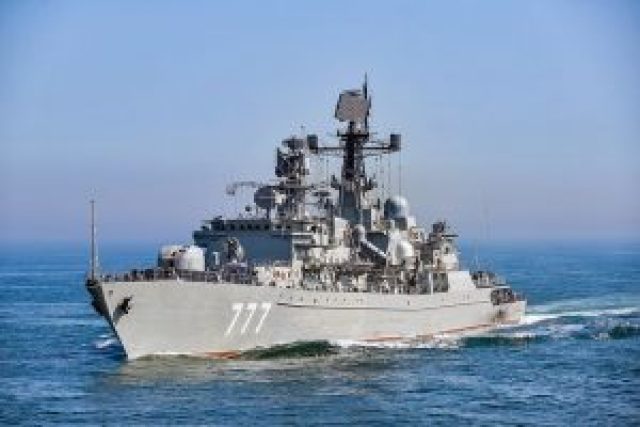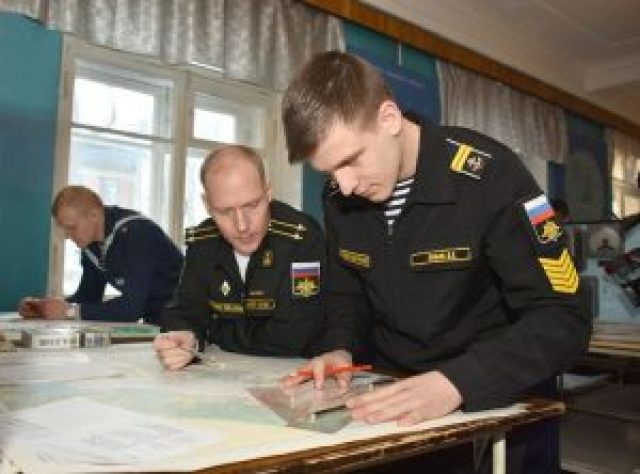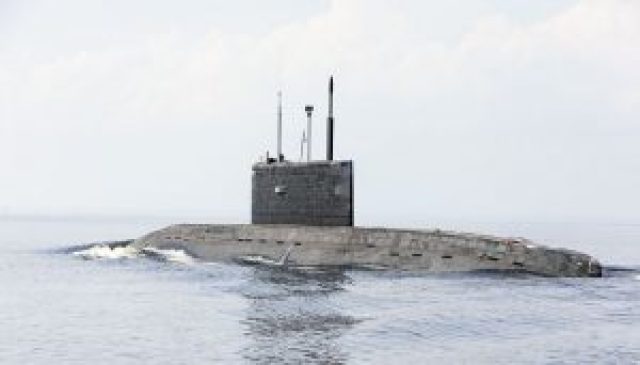Since the time of Peter the Great, the navigator's profession has been of particular importance in the navy, and navigation experts have already been honored on a certain day in modern Russia.
January 25 – Navy Navigator's DayRear Admiral Eduard Luik.

Image source: redstar.ru
This year it will be 25 years since, according to the order of the Commander-in-Chief of the Navy, on January 25, specialists plotting the course of warships, ships and aircraft of naval aviation will celebrate their professional holiday, calculate their movement, monitor the proper operation of navigation devices.
Every sailor and pilot understands how important it is to thoroughly study a new area of the World Ocean, to accurately plot the course of the ship, to provide for safety measures for navigation and flight. On the eve of the Navy Navigator's Day, Rear Admiral Eduard Luik, the chief navigator of the Navy, told about the peculiarities of the profession and the most important achievements in an interview with the correspondent of the Red Star.– Eduard Endelevich, how was the date of the celebration of the navigator's service determined at the time?
– The navigator's profession originated with the publication of the decree of Peter I on the establishment of the School of Mathematical and Navigation Sciences (Navigation School).
It happened on January 25, 1701. Thus, one of the first state educational institutions in Russia was created, which marked the beginning of the development of the navigation service.
In the history of modern Russia, this date was determined for the professional holiday of specialists of the Navy's navigation service. The corresponding order was signed on July 15, 1996 by Fleet Admiral Felix Nikolaevich Gromov, who was then Commander-in-Chief of the Navy. Since 1997, for a quarter of a century, it is on January 25 that the specialists of the navigation service celebrate their professional holiday.
And before that, in our country, the Day of the navigator of the Navy was celebrated twice a year on days related to the position of the earth relative to the sun. The dates of the spring (March 20-21) and autumn (September 22-23) equinoxes were chosen for the celebration. I think many people understand the connection of the profession with astrogation: of all the specialists in the Navy, navigators use their knowledge in this field the most.
– How do naval navigation experts traditionally celebrate their holiday?– The navigator's profession has always been responsible and creative.
It constantly requires new knowledge, generalization of experience, improvement of practical activities. According to a long-standing and unbreakable tradition, on its professional holiday, the navigation service summarizes the results of the year, organizes festive events, honors the best navigators of the Navy. Special attention is paid to the best teachers of the navigator specialty of military educational institutions and distinguished cadets.
– How comprehensive is the structure of the navigation service?– The navigational service of the Navy unites the personnel of navigational combat units of ships and submarines, staff officers of various levels, scientific and pedagogical staff of special departments and cycles.
The basis of the navigational service consists of officers of navigational combat units and flagship navigators of formations.
The structure of the navigation service is carefully thought out and calculated, which allows shipboard specialists to successfully solve the tasks facing the ships of the Navy. And this is, first of all, ensuring accurate and safe navigation, the development of navigation data for all consumers of the ship, including high-precision weapons.
– What was the year 2021 like for the Navy?– The tasks assigned to the navigation services of the fleets in 2021 have been successfully solved.
In the past year, the intensity of operational and combat training of fleets has significantly increased. Special attention should be paid to the successful solution of tasks during exercises in ocean areas under the leadership of the Commander-in-Chief of the Navy with the implementation of an inter-fleet maneuver of forces with the creation of interspecific groups.
In 2021, navigators solved tasks on ships and submarines carrying combat service and combat duty, when performing special tasks, in long-distance sea voyages and exercises, as well as during planned combat training.
Of great importance is the experience gained by navigators in the seas of the Arctic and Antarctic, when performing training firings with modern weapons from new, non-traditional areas for combat training. The navigational experience of ensuring high-precision navigation of diesel submarines of the Black Sea Fleet in the Mediterranean Sea is also important. The circumnavigation of the oceanographic research vessel Admiral Vladimirsky is of great importance. Among its positive results, we can mention valuable information about the navigational-hydrographic and hydrometeorological features of the navigation areas.
Analyzing the experience gained over the year, I want to note that on the routes of each voyage, the information described in the Loci, manuals and manuals on navigation was checked. The received clarifications were immediately entered on the maps, since timely notification of changes in the navigation situation is a condition for safe navigation of ships. Such a task is faced by every navigator and hydrographer in all campaigns of warships and auxiliary vessels. We have gained a lot of experience. Now it is being analyzed, and then it will be applied in the training of new personnel specialists of the navigation service.

Image source: redstar.ru
– Which fleet is recognized as the best in navigation?– The best results were achieved by the navigator of the Northern Fleet under the leadership of the chief navigator, Captain 1st rank Denis Kovalev.
During the year, ships and vessels of the Northern Fleet made 26 long-distance voyages, made 14 business calls to foreign ports of eight states.
A detachment of warships of the Northern Fleet led by the large anti-submarine ship "Vice Admiral Kulakov" made a long-distance trip to the Gulf of Guinea lasting 158 days, traveled more than 28,000 nautical miles and made six port calls in five foreign countries. It should be noted that on October 25, 2021, the ships prevented the hijacking of the container ship "Lucia" by pirates en route from Togo to Cameroon. It is noteworthy that throughout the entire campaign, the commander of the navigational combat unit of the BOD "Vice Admiral Kulakov", Captain of the 3rd rank Georgy Zykin, successfully solved the tasks of ensuring navigation safety of navigation and issuing navigation data for the successful completion of tasks.
Another detachment of ships of the Northern Fleet, led by the large anti-submarine ship Severomorsk, completed the tenth Arctic campaign. Its participants solved problems in the water area stretching from the North Atlantic Ocean to the East Siberian Sea. The detachment of ships operated in difficult ice conditions, made a passage to the port of Dudinka along the Yenisei River and performed a route depth measurement in the Laptev Sea. A good experience in solving problems in difficult ice conditions was obtained thanks to the flagship navigator, Captain 2nd rank Evgeny Anufriev.
– What distinguished other operational-strategic associations of the Navy?– A detachment of warships of the Pacific Fleet consisting of the corvette "Gremyashchy" and the submarines "Volkhov" and "Petropavlovsk-Kamchatsky" made an inter-fleet transition from the Baltic Fleet to the Pacific Fleet.
He arrived in the city of military glory Vladivostok from heroic Kronstadt, having crossed seven seas (Baltic, Northern, Mediterranean, Red, Arabian, South China and Japan) and three oceans (Atlantic, Indian and Pacific). The transition lasted 150 days. In total, the ships left 17,000 nautical miles astern, visited the ports of five countries. A lot of work on systematization of the experience of solving navigation problems in various conditions of navigation in this campaign was carried out by the senior navigator of the campaign, captain of the 3rd rank Alexey Bogatinov.
On the Caspian Flotilla, the flagship navigator of the association, Captain 2nd rank Egor Etmekchyan, successfully organized a system of operation and combat use of navigational weapons of high–precision weapons carriers.
In the Black Sea Fleet, the flagship navigator of the task force, Captain 2nd rank Konstantin Yagupov, carried out a lot of work on systematizing the experience of solving navigation problems of navigation in difficult conditions, including in the long-range operational zone.
As for the Baltic Fleet, here once again the tasks of operating the navigational armament of the new corvettes were successfully solved, the organization of the combat use of navigation complexes of ships under the leadership of the flagship navigator of the Baltic Navy, Captain 2nd rank Andrey Fedorchuk, was worked out.
The most important exam for professionalism for many navigators was the Main Naval Parade, which was held in the Northern capital for the fifth time. The flagship navigator of the Leningrad Naval Base, Captain 2nd Rank Dmitry Minaev, demonstrated high performance in the organization of the navigation service, ensuring navigation safety measures for ships participating in this festive action in St. Petersburg.
As you can see, the navigator's profession is very complex, multifaceted and responsible. And the geography of the use of skill is the entire World Ocean.

Image source: redstar.ru
– Despite the complexity of the specialty, the highest competition in naval universities is celebrated at the navigation faculty. What are the requirements for applicants?– The navigator's education has been recognized for many years as one of the best in the Navy.
It is no coincidence that graduates of higher naval schools who have received the specialty "Navigation and operation of marine navigation aids" easily master primary navigational positions in the navy.
In educational institutions, such high results were achieved thanks to a set of organizational measures. Among them is a high-quality selection of candidates for enrollment in the first year of colleges. We accept the best representatives from among the applicants, assessing first of all the level of preparation of candidates according to the results of the Unified State Exam in mathematics, physics, Russian language. There are also high requirements for the health, physical fitness and moral and psychological qualities of candidates.
Among the enrolled first-year students, the majority are graduates of schools, applicants with experience of service in the Armed Forces, graduates of the Nakhimov Naval School and its branches, as well as graduates of cadet corps. The successors of military dynasties and young men who grew up in remote garrisons are highly motivated to study.
– Where can I get a navigator's specialty now?– Navy navigators are trained in three educational institutions.
This is the Naval Institute of the VUNC of the Navy "Naval Academy" – the so-called Peter the Great Marine Corps in St. Petersburg. In Vladivostok, specialists in navigation and operation of marine navigation aids are trained at the Pacific Higher Naval School named after S.O. Makarov, in Sevastopol - at the Black Sea Higher Naval School named after P.S. Nakhimov.
I would like to note that the scientific and pedagogical staff of special navigation departments is distinguished by a high professional level. Teachers and commanders are fundamentally demanding to study throughout all five years of training. Cadets receive high-quality practical training in navigational trips on training ships, during naval internships. Of great importance is the organization of targeted training that cadets undergo in the fifth year.
The navigator's specialty is as fascinating as it is complex. It is not easy to study, the cadet requires diligence and perseverance, a great desire to master the entire training program, get practical skills. The acquired knowledge will allow young officers to conscientiously perform all duties in navigational positions, and, if desired, will ensure successful promotion along the command line and in headquarters.
– How are navigational trips organized? What duties are assigned to the cadets during the voyage?– The navigator's trip is one of the main stages of training future specialists.
It takes place on a training ship and is carefully prepared. Cadets in real sea conditions consolidate their theoretical knowledge by practical solution of navigational problems of navigation. During the voyage, future navigators, in the course of their specialty, not only develop professional skills, but also lay down important maritime qualities of character.
Hikes are conducted on the training ships of the Leningrad naval base "Perekop" and "Smolny", which are equipped with training classes with special navigational simulators. This allows you to conduct training in full in accordance with the curriculum.
During their studies, all cadets will visit two long-distance navigation trips, which will take place after the second and fourth courses. Depending on the stage of training, different goals are set. So, sophomores need to get practical skills in solving navigational problems of navigation, to master simple ways of calculating the ship's path. And the cadets of the senior course will already independently carry the navigator's watch on the ship, and in full with the actual independent conduct of the ship at the appointed course.
We are planning the routes of the training ships, taking into account the maximum coverage of the navigation areas of the Navy ships. This will help future navigators to study the maritime theater of navigation, delve into the navigational features of coastal areas, teach them to follow in the narrowness and in international straits.
– What are the features of the experience gained in recent years?– We consider the development of hiking routes around Eurasia by training ships to be a great achievement.
The crews of the training ships carried out trips with cadets on board by the Northern Sea Route, both from west to east and in the opposite direction. It is pleasant to note that the organization of navigational training on training ships on long voyages is constantly being improved under the guidance of the heads of the departments of navigation and technical means of navigation of educational institutions. Captains of the 1st rank Mikhail Sazhaev, Yuri Ipatov, German Zabrodin and Gennady Khudyakov have developed new programs and methods of training cadets. All this work has had a positive impact on the results of training specialists.
– How will the cadets remember the navigational campaigns of 2021?– In 2021, four stages of navigational campaigns were held on the Smolny training ship.
During this time, cadets of the 4th year of the navigational specialty in one hundred percent composition were prepared and admitted to the independent bearing of the navigator's watch.
Additional measures were also taken to train cadets: a special exercise was held to determine the maneuverable elements of the ship and perform deviation work at sea, ostentatious exercises were organized to prepare the ship for the passage of narrowness, ostentatious training, OBU, CBU in the warhead-1. The practical exercises on the implementation of navigation and tactical calculations when performing combat exercises with the use of the ship's artillery armament were successfully completed. I think that many will remember the exercise on the actions of the personnel of the Smolny training ship when performing the "Man overboard" maneuver.
And for the brightness of impressions from visits to seaports and visits to naval bases, a series of military-patriotic events was specially organized and conducted for cadets.

Image source: redstar.ru
– How is the equipping of new ships with modern navigation aids going?– With the change in the forms and methods of application of new ships and support vessels of the Navy, they are being equipped with new models of marine navigation aids, electronic cartographic navigation and information systems (ECDIS).
Integrated navigation systems, automatic identification systems, integrated bridge systems, inertial navigation systems and other equipment are being introduced. Undoubtedly, this requires the development and implementation of new methods and methods of using equipment in the interests of fulfilling the tasks assigned to the ship.
In this regard, knowledge about the methods of calculating, determining the location, solving navigation problems of navigation, developing navigation and tactical data and documenting the circumstances of navigation is systematized. I would like to note that over the past year, navigators have successfully worked out new ways of counting using ECDIS.
The implementation of promising methods of visual automated determination of the ship's location by coastal landmarks based on optoelectronic means is planned. Tests of new astrogation systems are continuing, which will help to continuously determine the coordinates of the ship's location with high accuracy. The introduction of the capabilities of advanced systems will automate the navigation process, reduce dependence on satellite radio navigation systems, and, consequently, increase the accuracy and secrecy of navigation of ships.
Olga VOROBYOVA, "Red Star"Saint-Petersburg
